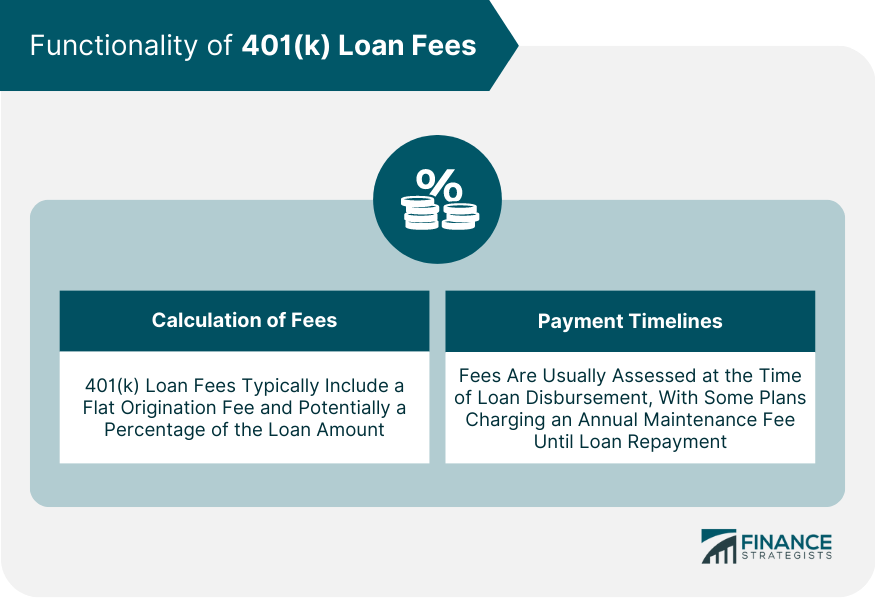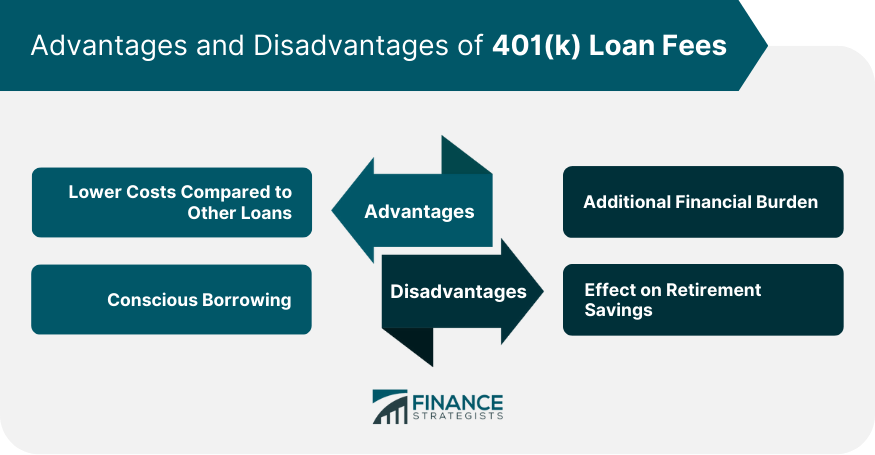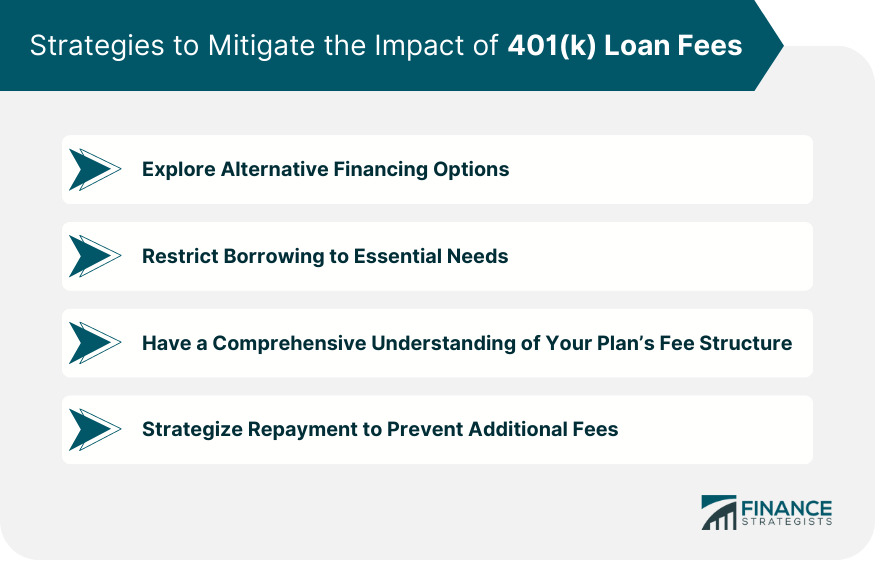401(k) Loan Fees Overview
401(k) loan fees refer to the costs incurred when borrowing from a 401(k) retirement account.
These can include origination fees, which cover the administrative costs of setting up the loan, and potentially maintenance or annual fees, which apply throughout the life of the loan.
The purpose of these fees is to cover the expenses associated with processing and managing the loan by the plan administrator.
401(k) loan fees can have a significant impact on an individual's retirement savings, as they are often deducted directly from the loan proceeds or the 401(k) account, thus reducing the overall account balance.
Furthermore, these fees can make 401(k) loans a more expensive borrowing option compared to alternatives.
Understanding 401(k) loan fees is essential for anyone considering a 401(k) loan, as these fees can influence the cost-effectiveness and suitability of this borrowing option.
Functions of 401(k) Loan Fees
Calculation of Fees
Loan fees vary by plan but usually involve a flat fee for loan origination, typically around the lesser of $50,000 or 50% of the total amount of the 401(k), and may also include a percentage of the loan amount.
These fees are either deducted from the loan proceeds or added to the loan balance.
Payment Timelines
Fees are typically assessed at the time of loan disbursement, but some plans may charge a recurring annual maintenance fee until the loan is repaid.

Advantages of 401(k) Loan Fees
Lower Costs Compared to Other Loans
While no one likes to pay fees, those associated with 401(k) loans can be lower than the costs of other forms of credit. For example, 401(k) loans do not require a credit check, which could lead to better terms for borrowers with lower credit scores.
Conscious Borrow
The fact that borrowing from a 401(k) comes with costs may make borrowers think twice before dipping into retirement savings, encouraging more conscious financial decision-making.
Disadvantages of 401(k) Loan Fees
Additional Financial Burden
401(k) loan fees add to the overall cost of borrowing. These charges, along with the interest paid on the loan, increase the amount that must be repaid, adding to the borrower's financial burden.
Effect on Retirement Savings
Since the fees for a 401(k) loan is generally deducted from the loan proceeds or the borrower's account, they effectively lower the total retirement savings.
If a borrower takes out multiple loans, these costs can accumulate and have a significant impact on the final retirement sum.

Strategies to Mitigate the Impact of 401(k) Loan Fees
Exploring Alternative Financing Options
Before considering a 401(k) loan, evaluate other financing options. Personal loans, home equity loans, or even credit cards may provide better value, depending on the fees and interest rates involved.
Restricting Borrowing to Essential Needs
If you borrow from your 401(k), restrict it to essential needs. Smaller, more frequent loans can quickly add up in fees, having a more significant impact on your retirement savings than a single, larger loan.
Comprehensive Understanding of Your Plan's Fee Structure
Different 401(k) plans have different fee structures. Be sure to thoroughly understand how your plan's fees work before taking out a loan. This knowledge can help you effectively calculate the total cost of the loan.
Repayment Strategies to Prevent Additional Fees
Develop a repayment strategy to avoid potential additional fees. For example, if you fail to repay your loan within the stipulated timeline, it may be considered a distribution and become subject to taxes and penalties.

Effect of 401(k) Loan Fees on Borrowers
Financial Consequences
The financial consequences of 401(k) loan fees can be substantial. Not only do they increase the cost of borrowing, but they can also impede your ability to grow your retirement savings and reach your retirement goals.
Implications for Retirement Plan
Borrowing from a 401(k) can offer a quick financial fix but remember that the implications extend beyond the immediate need for cash. The fees associated with 401(k) loans and the interest can impede your long-term retirement planning.
Conclusion
401(k) loan fees, comprising of origination and potentially ongoing fees, are a crucial consideration for potential borrowers.
While these fees may seem minor, their impact can be substantial over time, especially when considering the reduction in overall retirement savings.
The costs of these fees can make 401(k) loans a more expensive borrowing option, necessitating careful consideration of other alternatives.
Understanding and strategizing around your plan's fee structure, limiting borrowing to essential needs, and developing an efficient repayment strategy can help mitigate the potential negative impacts of these fees.
As with any financial decision, it is paramount to consider not only the immediate benefits but also the long-term implications for your retirement planning.
Remember, dipping into your retirement savings should generally be a last resort, as the costs—both immediate and deferred—can be significant.
401(k) Loan Fees FAQs
401(k) loan fees are charges associated with borrowing from your 401(k) retirement savings. They often include origination fees and possibly maintenance or annual fees.
The fees associated with a 401(k) loan cover the administrative costs related to processing and maintaining the loan.
The calculation of 401(k) loan fees varies by plan. There's usually a flat fee for loan origination and potentially a percentage of the loan amount.
Yes, since 401(k) loan fees are typically deducted from the loan proceeds or your account, they effectively lower your total retirement savings.
To manage 401(k) loan fees effectively, understand your plan's fee structure thoroughly before taking out a loan, explore alternative financing options, and restrict borrowing to essential needs only.
True Tamplin is a published author, public speaker, CEO of UpDigital, and founder of Finance Strategists.
True is a Certified Educator in Personal Finance (CEPF®), author of The Handy Financial Ratios Guide, a member of the Society for Advancing Business Editing and Writing, contributes to his financial education site, Finance Strategists, and has spoken to various financial communities such as the CFA Institute, as well as university students like his Alma mater, Biola University, where he received a bachelor of science in business and data analytics.
To learn more about True, visit his personal website or view his author profiles on Amazon, Nasdaq and Forbes.











